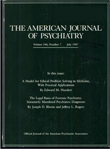Seven-month clinical outcome of anhedonic and normally hedonic depressed inpatients
Abstract
Using a measure of capacity for pleasurable experiences (the Pleasure Scale), the authors compared at admission and 7-month follow-up 74 psychiatric inpatients meeting DSM-III criteria for major depression. Pleasure scores were stable over 7 months despite the fact that two- thirds of the sample recovered from depression. The subgroup of subjects who were most anhedonic at admission were more likely than the remaining subjects to show clinical recovery but persisted in exhibiting a lower pleasure score (even when the comparison was limited to recovered subjects). Pleasure scores were much better predictors of clinical recovery than were neuroticism scores.
Access content
To read the fulltext, please use one of the options below to sign in or purchase access.- Personal login
- Institutional Login
- Sign in via OpenAthens
- Register for access
-
Please login/register if you wish to pair your device and check access availability.
Not a subscriber?
PsychiatryOnline subscription options offer access to the DSM-5 library, books, journals, CME, and patient resources. This all-in-one virtual library provides psychiatrists and mental health professionals with key resources for diagnosis, treatment, research, and professional development.
Need more help? PsychiatryOnline Customer Service may be reached by emailing [email protected] or by calling 800-368-5777 (in the U.S.) or 703-907-7322 (outside the U.S.).



